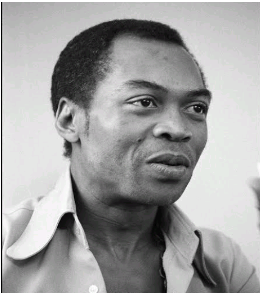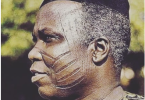The lean but muscular, exposed chest of the firebrand singer glistened with sweat; matched with a daunting voice. And his political jabs were in perfect synchronization with the intoxicating rhythms of his entire band. His instrumentalists added uncommon fervor and variety with their beats, which blended powerfully with his solo instrumental rendition; he was a gifted saxophonist. These were hallmarks of iconic musician and human rights activist – the legendary ‘Abami Eda‘ named Fela Kuti. His scantily but colorfully dressed backup singers and dancers flaunted body beads and painted faces, rocking their bodies with a carefree spirit.
Fela Kuti created Afrobeat music out of a fusion of Yoruba traditional rhythms, jazz, highlife, funk, and calypso, which produced a highly danceable and unique music genre. Today, Afrobeat has laid the foundation of modern Afrobeats, which spawned and inspired world-class artists such as Burna Boy, Tiwa Savage, Wizkid and Davido. It has propelled Nigeria to global prominence in the world of arts and entertainment like nothing else. Equally notable is the strong activism and pan-African liberation movement birthed by Fela Kuti and Afrobeat.
Fela Kuti was altogether the voice that defied and challenged the authoritarian rule and abuses of the Nigerian military government of his era. His music became a powerful artistic expression, speaking the minds of thousands of weary citizens who yearned for better governance and fairness. Perhaps in the entire history of mankind, very few persons (if ever) used their musical talent to demand for social change as strongly as Fela Kuti did. Afrobeat became a phenomenon – a Pan-African movement and liberation struggle that resonated through the ages, long after his death. That movement refused to die till the present day.
Who Was Fela Kuti?
Born Olufela Olusegun Oludotun Ransome-Kuti in 1938, Fela is one of the three sons of Reverend Israel Oludotun Ransome-Kuti – an Anglican minister and school principal. The father was reputed to be the first president of the Nigerian Union of Teachers. His mother, Chief Olufunmilayo Ransome-Kuti, was a renowned feminist and activist who actively campaigned against British colonial rule. The entire family are Yoruba people of Egba extraction, who were based in Abeokuta, Ogun state.
How Fela Kuti Stepped into Music Career
Both of Fela’s brothers chose to pursue Medicine as a profession. At first, it appeared Fela would follow in their footsteps; as he initially went to London in 1958 to study Medicine. But he soon realized his destiny was different from theirs. Rather, Fela chose to attend the Trinity School of Music, and embarked on learning how to play a range of musical instruments. Within that period, he formed his first-ever music band named Koola Lobitos. And they specialized in playing a fusion of highlife and jazz music for many years.
In 1963, Fela returned to Nigeria. He was employed at the Nigerian Broadcasting Corporation to work as a radio producer. Nevertheless, he continued to produce and experiment with his music; and even re-formed his original band, the Koola Lobitos. Fela embarked on a trip to Ghana, and invented the name Afrobeat for his unique style of music right there.
The Beginnings of Fela Kuti’s Activism
Yet again, Fela Kuti left for the United States in 1969, where he was resident for 10 months in Los Angeles. He had an encounter with Sandra Izsadore (a member of the Black Panther Party) and the Black Power movement. His interaction with Izsadore greatly influenced his emergent political views, and motivated him into producing music that fused into activism. While still in the USA, Fela renamed his band Nigeria ‘70; and eventually adopted the band name Afrika ‘70 upon returning to Nigeria.
The iconic singer took a stronger political stance upon returning to Nigeria. He set up his abode and music studio, the Kalakuta Republic somewhere between Mushin and Yaba areas in Lagos. Yet again, he set up the Afrika Shrine, a night club at the Empire Hotel in Ikeja. The Kalakuta Republic and the Afrika Shrine soon became celebrated centers of music and creative expression for music lovers and poets.
Additionally, the Kalakuta Republic stood defiantly against government control, and soon became a hotbed for political activism. With time, Fela changed his family name from Ransome-Kuti to Anikulapo-Kuti, choosing to dissociate from any hint of colonial affiliation. The ‘Anikulapo’ (Yoruba translation ‘One with death in his pocket’) suggested that he was above control or manipulation.
Echoes of The Kalakuta Republic
Fela was unbridled in his scathing criticism of the abuses and corruption of the Nigerian military government of that time. He freely channeled his political views through his music. And not surprisingly, the government forces saw him as a rebel, with a growing animosity towards him. Before long, Kalakuta Republic became a targeted spot for many raids. The situation reached a breaking point when Fela Kuti released the album ‘Zombie’ in 1977. He sharply criticized Nigerian soldiers in their absolute obedience to their superiors, comparing them to zombies.
The swift and brutal reaction of the government to his album went down the annals of history as an unforgettable event. About 1000 soldiers besieged the Kalakuta Republic, beating and dehumanizing its occupants (band members, fans, and family members). Fela was badly beaten almost to the point of death. His mother, who witnessed the attack, was thrown down from a window upstairs; and she died from her bruises. The entire building was burnt down.
Nevertheless, Fela refused to give up his activism. Neither did the government stop harassing him. For a short while, he set up a political party namely Movement of the People (MOP), but it could not take root. They were reportedly denied recognition, and could not be registered. Fela released other sharp political commentaries in his music, such as ‘ITT’ (International Thief Thief). Fela was arrested in 1984 and charged with the offence of currency smuggling for two years. In the interim, several human rights groups challenged the arrest until he was released.
Quite unfortunately Fela had personal challenges that hinted at not being able to recover fully from the Kalakuta Republic incident. He had a running battle with indian hemp; then married and divorced forty of his dancers in a queer ceremony. He eventually died from health complications linked with AIDS in 1997. But his memory could never be wiped out.
Memorials of Fela Kuti: His Legacy Lives On
The Kalakuta Museum in Ikeja was opened in October 2012 in honour of Fela Kuti and the Afrobeat movement. And the erstwhile Governor of Lagos state (Akinwunmi Ambode) was said to have donated funds towards upgrading the museum in 2017. Yet again, the Felabration festival is held every year in honor of the legendary singer, from 1998 to date (with the exception of 1999). For many years to come, Fela Kuti’s name will still be mentioned as a symbol of justice and human rights in Africa and worldwide.







